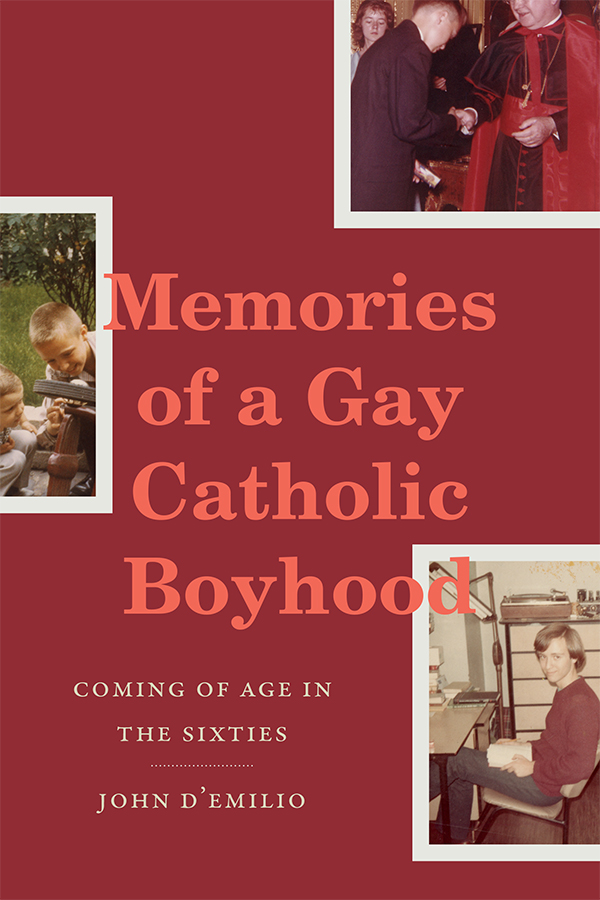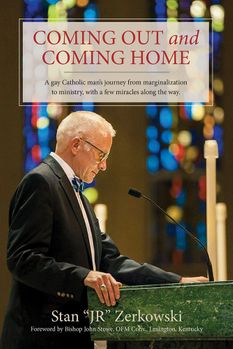It has become common on college campuses for a week to be designated as LGBTQI Pride Week or something similar. During this week, a number of events occur that aim to help the community at large understand, support and celebrate people who experience themselves as sexual minorities.
A highlight of the week is often a guest speaker, frequently an actor or sports figure, who speaks to their experience as a gay man or lesbian. This talk is often characterized by the speaker’s history of a deep sense of alienation, marginalization and ostracization. This feeling of alienation can be reinforced by family, school and religion. Only the hard work of self-acceptance, these speakers suggest, can relieve the despair that such alienation can engender.
This narrative is quite different from the story offered in John D’Emilio’s informative and enjoyable memoir, Memories of a Gay Catholic Boyhood. Without suggesting that the process of accepting himself as a gay man within a traditional Italian American, staunchly Catholic, Republican family environment during the 1960s was easy or pleasant, D’Emilio does not give the reader a story of rejection, angst and self-hatred.
Actually, in many ways, D’Emilio, an emeritus professor at the University of Illinois and a noted scholar of LGBTQ history who has twice received the Stonewall Book Award, inhabited a world of extended family, Catholic schools and parish life that offered a relatively safe space for him to discover himself as a politically progressive gay man.
Memories of a Gay Catholic Boyhood offers us a caring and thoughtful window into a time of enormous change in American society and the Catholic Church.
Unlike the novelist and critic Mary McCarthy, whose Memories of a Catholic Girlhood was characterized by precocious atheism and a sense that priests were generally idiots, D’Emilio found an intellectual, warm and affectionate home in the Catholic community, particularly at Regis High School, the academically elite Jesuit prep school in Manhattan.
The Regis of D’Emilio’s time was not a place of bullying or name-calling, but rather a place where excellence in the classical languages was expected and esteemed, while proficiency in debate or forensics was as highly prized as athletic prowess.
In a particularly touching recollection, D’Emilio remembers a Mr. Ridley, a young Jesuit scholastic who recommended that D’Emilio do a book report on James Baldwin’s Another Country. Whether the young Jesuit was just an admirer of Baldwin’s work or whether he suspected that D’Emilio was same-sex-attracted is unclear. Still, such a recommendation of a book featuring homosexual relations would have been extraordinary at a Catholic high school in 1963.
For D’Emilio, the novel provided an explanation for the inchoate feelings and same-sex desires that he was beginning to experience.
Like many Catholic boys of his generation, he suffered great anxiety and guilt about his sexual desires and experiments, but his coded attempts to mention them to his Jesuit teachers were met with responses as benign as they were inept.
D’Emilio reports that his mother liked to claim that Regis—and by extension the Jesuits—ruined him. D’Emilio would disagree. He suggests that Regis was, in many ways, the making of him. One thing that does seem certain is that his Regis education, as rigorous as it was, did not adequately prepare him for the pervasive secularism of the late-1960s Ivy League he entered after graduating high school.
According to D’Emilio, it was only when he was already at Regis that the school agreed to support college applications to Ivy League universities, and this only after parents threatened a lawsuit. The school administration at that time feared the world outside of the Catholic bubble—and with good reason. The religious education and formation a boy received at Regis in the mid-’60s was no match for the “death of God” movement and the social upheaval he would experience at Columbia University.

What the Jesuits and other teachers at Regis did prepare D’Emilio for was the emerging post-Second Vatican Council emphasis on social justice and a new openness to pacifism. It was the newly ordained Father Ridley who accompanied young D’Emilio to the draft board hearing in the Bronx that established D’Emilio’s status as a pacifist at the height of the Vietnam War.
As attractive as he found this Christian commitment to social justice, it was ultimately not a strong enough attraction to sustain his Catholic identity.
D’Emilio relates how he distanced himself from the institutional church, not essentially because of his sexual orientation but rather due to the church’s institutional and dogmatic nature. He quickly became not an atheist or “ex-Catholic,” but what he refers to as a “lapsed Catholic.”
Not so much McCarthy’s Catholic girlhood, but perhaps more like Lord Marchmain in Brideshead Revisited. He was and still is, he notes, attracted to the divine and to the mystical dimensions of human experience.
As D’Emilio applies his skills as an acclaimed social and cultural historian to his own youth, Memories of a Gay Catholic Boyhood offers us a caring and thoughtful window into a time of enormous change in American society and the Catholic Church. His account is warm and gracious; he is quick to acknowledge his own limitations while acknowledging the crucial role of his friends and family in shaping and loving the gay Catholic man he became.
This review has been co-published with America magazine.



